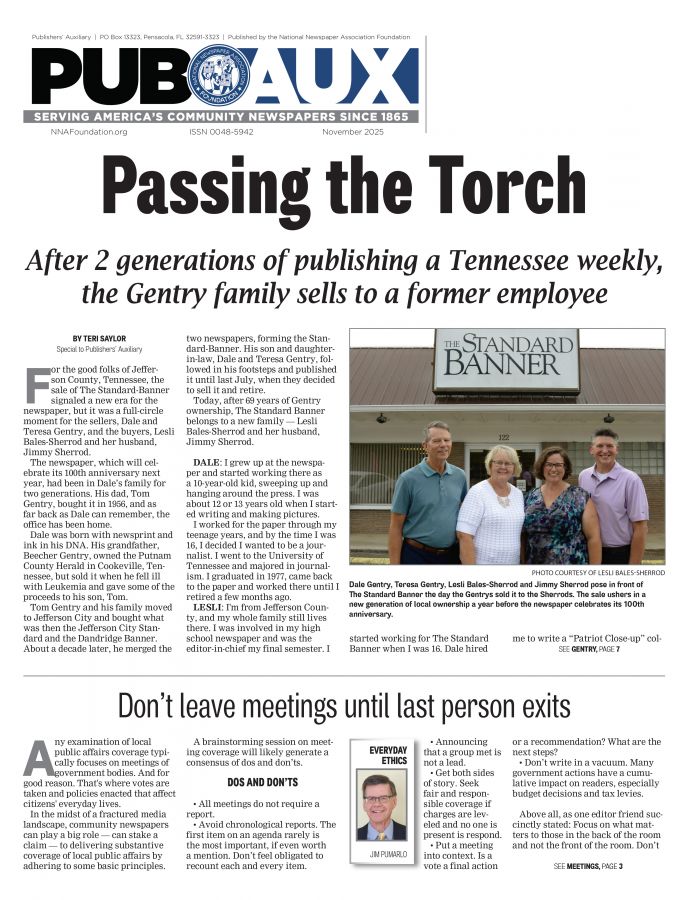NNA opposes USPS ad deal with Valassis
May 21, 2012
The National Newspaper Association today said it would oppose a proposal by the U.S. Postal Service to give advertising aggregator Valassis Direct Mail Inc., postage discounts that are not available to newspapers' Standard Mail shoppers in competition for advertising supplements.
NNA President Reed Anfinson said NNA is watching with growing concern the actions being taken by USPS to insert itself increasingly into the local advertising marketplace. The proposed Valassis deal adds to an earlier program called Every Door Direct Mail, which calls for postmasters to solicit newspaper advertisers to send out ad mail directly from the post office rather than advertising in news media, which weakens local news organizations' ability to serve readers.
In a statement issued by the NNA board of directors, NNA said:
"The Postal Service at its historic root was founded by our nation’s leaders to bind the nation and support the crucial role newspapers play in democracy—of keeping citizens informed. It risks its compact of trust with American businesses and citizens when it begins playing favorites among its customers. Local advertising markets are fully competitive—with newspapers, the Internet, radio, TV, billboards and even door-hanger advertising. The Postal Service holds a monopoly in the mail so it can serve the public, not so it can disrupt and damage this fiercely competitive market. If it treats all fairly and does its job well, the mail will grow via private business initiative."
The Valassis proposal consists of a contract between that advertising company and USPS to increase its mail volume by a million pieces by starting new marriage mail packages in its existing markets in the coming year in exchange for steep 20 percent - 32 percent discounts. The contract is a Negotiated Service Agreement (NSA), a tool USPS has used in the past to establish favorable pricing agreements with package shippers and some other types of mailers, mostly First Class. NNA has said in the past that NSAs can be inherently discriminatory when used in competitive markets that involve small businesses because they favor a single large mailer. In the end, NNA believes, the NSAs that disrupt competition will drive away a sustainable mail volume.
The proposal is being considered by the Postal Regulatory Commission.
Newspapers concerned about the proposal may contact the PRC directly by writing its chairman. Hard-copy overnight mail is preferred and most likely to have an impact. Letters may also be sent through the PRC's website at www.prc.gov. NNA talking points follow, but newspapers are strongly urged to use their own words.
To: Ruth Goldway
Chairman Postal Regulatory Commission
901 New York Avenue NW, Suite 200
Washington, DC 20268-0001
POINTS TO CONSIDER WHEN DISCUSSING PROPOSED VALASSIS DIRECT MAIL INC. AGREEMENT
1. Special contracts between the Postal Service and large national mailers that are directed at the local advertising marketplace are inherently discriminatory and unfair.
- The Valassis contract would require it to carry advertising only for companies with outlets in more than 30 stores and to produce more than 1 million new mail pieces in a year. No community newspaper could achieve such a goal.
- Because USPS's Negotiated Service Agreements to date have each been arranged with a single large company, smaller local companies are shut out of the deals.
- There may be other large marriage mailers who apply for similar contracts, freezing out smaller competitors entirely.
2. If your newspaper currently has a TMC or shopper in the mail, estimate how many pieces and how much money you spend in a year. State whether you believe the loss of Valassis advertising would cause you to decide to move your delivery out of the mail into private distribution.
- If the Postal Service loses the newspaper mail in an attempt to capture the Valassis mail, it is likely to see a net loss of business—particularly if Valassis then decides to put its inserts into the private-delivered newspaper.
- If the advertising remains in the mailstream, it will be the same mail piece at a lower price.
- The net effect of this proposal is not likely to produce a sustained new mail volume for USPS but simply to force lower prices for advertising, leaving USPS direct mail even less competitive.
- USPS' direct attempt to divert advertising from newspapers engenders a hostile relationship with good newspaper customers. Add this Valassis proposal to USPS' existing attempts to get postmasters to sell direct mail to local newspaper advertisers, and you have a pretty negative business relationship.
3. Local advertising markets are plenty competitive enough. USPS' monopoly powers are not needed to make them competitive. o Provide an overview of how much competition is in your market for advertising now.






